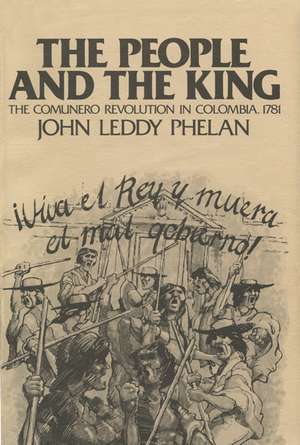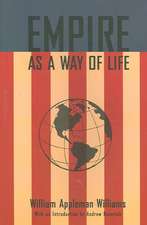The People and the King: The Comunero Revolution in Colombia, 1781
Autor John Leddy Phelanen Limba Engleză Paperback – 31 mai 2011
In The People and the King, John Leddy Phelan reexamines a well-known but long misunderstood event in eighteenth-century Colombia. When the Spanish colonial bureaucratic system of conciliation broke down, indigenous groups resorted to armed revolt to achieve their political ends.
As Phelan demonstrates in these pages, the crisis of 1781 represented a constitutional clash between imperial centralization and colonial decentralization. Phelan argues that the Comunero revolution was not, as it has often been portrayed, a precursor of political independence, nor was it a frustrated social upheaval. The Comunero leaders and their followers did not advocate any basic reordering of society, Phelan concludes, but rather made an appeal for revolutionary reform within a traditionalist framework.
As Phelan demonstrates in these pages, the crisis of 1781 represented a constitutional clash between imperial centralization and colonial decentralization. Phelan argues that the Comunero revolution was not, as it has often been portrayed, a precursor of political independence, nor was it a frustrated social upheaval. The Comunero leaders and their followers did not advocate any basic reordering of society, Phelan concludes, but rather made an appeal for revolutionary reform within a traditionalist framework.
Preț: 306.38 lei
Nou
Puncte Express: 460
Preț estimativ în valută:
58.64€ • 63.72$ • 49.29£
58.64€ • 63.72$ • 49.29£
Carte tipărită la comandă
Livrare economică 21 aprilie-05 mai
Preluare comenzi: 021 569.72.76
Specificații
ISBN-13: 9780299072940
ISBN-10: 0299072940
Pagini: 332
Ilustrații: 6 illus., 2 maps
Dimensiuni: 152 x 229 x 20 mm
Greutate: 0.45 kg
Ediția:1
Editura: University of Wisconsin Press
Colecția University of Wisconsin Press
ISBN-10: 0299072940
Pagini: 332
Ilustrații: 6 illus., 2 maps
Dimensiuni: 152 x 229 x 20 mm
Greutate: 0.45 kg
Ediția:1
Editura: University of Wisconsin Press
Colecția University of Wisconsin Press
Recenzii
“A major contribution to our understanding of late colonial Spanish America.”—John Fisher, Bulletin of Hispanic Studies
“The People and the King skillfully unites narrative with analysis, and achieves its effects with a fine economy. It is Phelan’s best book and indeed it is one of the best and most readable books written on the eighteenth century in Spanish America.”—D. A. Brading, Centre for Latin American Studies, Bulletin of the Society for Latin American Studies
“A major contribution to our understanding of colonial Latin America. This well-written and well-documented history is recommended to both students and researchers of Latin American history and culture.”—The Colonial Latin American Historical Review
Notă biografică
John Leddy Phelan (1924–76) was professor of history at the University of Wisconsin–Madison and author of The Hispanization of the Philippines, Portuguese Society in the Tropics, and The Kingdom of Quito in the Seventeenth Century, all published by the University of Wisconsin Press.
Cuprins
Illustrations
Maps
Preface
Introduction
I Charles III
1. From Kingdoms to Empire: The Political Innovations of Charles III
2. From Kingdom to Colony: The Fiscal and Economic Program of Charles III
II Juan Francisco Berbeo
3. The Crowd Riots
4. Patricians and Plebeians in Socorro
5. A Utopia for the People
6. A Utopia for the Nobles
7. A Utopia for the Indians: The Resguardos
8. A Utopia for the Indians: Indians in Revolt
9. Confrontation at Puente Real de Vélez
10. A Non-Battle in Bogotá and the Invasion of Girón
11. "War, War, On to Santa Fe"
12. Rendevous in Zipaquirá
13. The Capitulations of Zipaquirá
14. The First Written Constitution of New Granada
III Antonio Caballero y Góngora
15. José Antonio Galán: Myth and Fact
16. The Second Enterprise against Santa Fe
17. The Reconquest of Socorro from Its "Infidelity"
18. The Carrot and the Stick
19. Caballero y Góngora and the Independence of Colombia
Note on the Sources
Notes
Index
Maps
Preface
Introduction
I Charles III
1. From Kingdoms to Empire: The Political Innovations of Charles III
2. From Kingdom to Colony: The Fiscal and Economic Program of Charles III
II Juan Francisco Berbeo
3. The Crowd Riots
4. Patricians and Plebeians in Socorro
5. A Utopia for the People
6. A Utopia for the Nobles
7. A Utopia for the Indians: The Resguardos
8. A Utopia for the Indians: Indians in Revolt
9. Confrontation at Puente Real de Vélez
10. A Non-Battle in Bogotá and the Invasion of Girón
11. "War, War, On to Santa Fe"
12. Rendevous in Zipaquirá
13. The Capitulations of Zipaquirá
14. The First Written Constitution of New Granada
III Antonio Caballero y Góngora
15. José Antonio Galán: Myth and Fact
16. The Second Enterprise against Santa Fe
17. The Reconquest of Socorro from Its "Infidelity"
18. The Carrot and the Stick
19. Caballero y Góngora and the Independence of Colombia
Note on the Sources
Notes
Index
Descriere
In The People and the King, John Leddy Phelan reexamines a well-known but long misunderstood event in eighteenth-century Colombia. When the Spanish colonial bureaucratic system of conciliation broke down, indigenous groups resorted to armed revolt to achieve their political ends.
As Phelan demonstrates in these pages, the crisis of 1781 represented a constitutional clash between imperial centralization and colonial decentralization. Phelan argues that the Comunero revolution was not, as it has often been portrayed, a precursor of political independence, nor was it a frustrated social upheaval. The Comunero leaders and their followers did not advocate any basic reordering of society, Phelan concludes, but rather made an appeal for revolutionary reform within a traditionalist framework.
As Phelan demonstrates in these pages, the crisis of 1781 represented a constitutional clash between imperial centralization and colonial decentralization. Phelan argues that the Comunero revolution was not, as it has often been portrayed, a precursor of political independence, nor was it a frustrated social upheaval. The Comunero leaders and their followers did not advocate any basic reordering of society, Phelan concludes, but rather made an appeal for revolutionary reform within a traditionalist framework.








